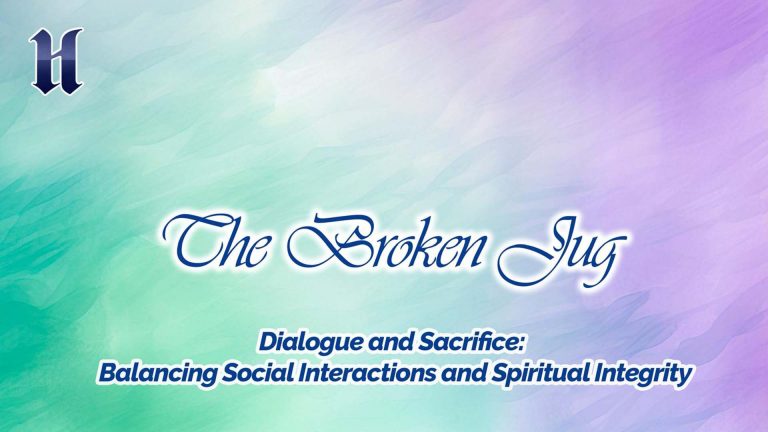Question: In The Gleams, Bediüzzaman lists the basic principles to attain true sincerity (ikhlas) for the volunteers serving faith. He relates the fourth principle as such: “As if it were you who possess the merits and virtues of your brothers and sisters, take pride in them and be thankful to God for them.” Taking into account the feeling of envy in human nature, what are your recommendations to ingrain this perspective in us?
Answer: While the Qur’an emphasizes in different verses that worship must be carried out solely for the sake of God, the issue is mostly presented with reference to the notion of sincerity, as in: “…so worship God, sincere in your faith in Him and practicing the Religion purely for His sake” (az-Zumar 39:2). In the next page, the Qur’an draws attention to sincerity again: “Say: “I am commanded to worship God, sincere in faith in Him and practicing the Religion purely for His sake” (az-Zumar 39:11). A few verses later, the importance of sincerity is emphasized once more: “Say: “I worship God, sincere in my faith in Him and practicing the Religion purely for His sake” (az-Zumar 39:14).
The Most Important Means for Divine Support
Giving so much importance to the issue of sincerity, Bediüzzaman wrote two separate chapters in The Gleams on Sincerity, and summarized the essentials of this issue. The first principle to attain sincerity is, in the words of Bediüzzaman, “seeking good pleasure of God in one’s actions.” That is, the volunteers not cherishing any worldly or otherworldly expectations while carrying out their duty and taking God’s good pleasure as the essential purpose. If unintended fruits and rewards come along, they should be received with gratitude to God and by offering due praise to Him, within a consideration of acknowledging Divine blessings.
However, we should never forget that we are living in an age of arrogance, and we need to wonder whether the blessings showered upon us denote “istidraj”—everything going perfectly well before the wrath of God comes, as in the case of the Pharaoh. In order not to become a loser in a zone of winning, we must always say, “These are not the deserve of a humble slave like me; what could be the reason for bestowing all these blessings so benevolently?” We also need to be vigilant against the possibility of a “gradual advance toward perdition” (istidraj), as we have mentioned, like the calm before the storm. Obviously, we are being granted Divine favors far beyond our eligibility. It is seen that so many great figures of profound discernment could not achieve a service as carried out by today’s volunteers, a great blessing God Almighty bestows by means of ordinary people. For this reason, we need to seek refuge in Him by opening our hands in prayer and saying, “O God, if these blessings we are granted are to pave the way for us toward growing insolent and arrogant, we seek refuge in You against it! Please do not let us go astray!”
Attaining sincerity, which is of central importance to one’s spiritual life, is actually in direct proportion with the strength of a person’s faith. For this reason, if believers gain insight into the creative commands (the laws of God’s creation) and the commandments of the Religion and then seek the ways of progress from faith by imitation to faith based on verification, if they, at the same time, try to become constantly oriented toward God in words, actions, and state, as God Almighty has lit the torch of faith in their hearts, He can similarly light the torch of sincerity one day. Thus, you can be able, by God’s grace and permission, to practice the values you believe with heartfelt sincerity.
Actually, suppressing the urges of placing emphasis on oneself, being able to see one’s shortcomings, coming to one’s senses after any assumptions of self-importance and seeking forgiveness from God immediately, and slamming a sledgehammer on the ego depends on two dynamics: becoming totally oriented to sincerity and attaining stronger certainty in faith. Someone who possesses these two qualities will be able to act in harmony with his or her fellow volunteers, because they know that it is not possible to realize anything of a grain’s worth without the help of God. And the most important means of that person receiving Divine help is maintaining harmony and unity among the volunteers. It is for this reason that Bediüzzaman emphasized from different angles the importance of the collective spiritual person of the volunteers. He saw this collective person as a significant factor in terms of attaining sound faith and passing to the next world with faith. In addition, he also stated that the good, righteous deeds of each person acting with such collective consciousness would be included in every member’s record of good deeds. Thus, the deeds of every single person will increase a thousand-fold through the secret of “shared blessings for good deeds realized collectively.”1 For example, a man may have initiated a process in a certain place in the name of guiding others. If there are ten other fellow volunteers sharing the spirit of brotherhood and taking the same step, every one of them may gain blessings as if each took a thousand steps. Since such people gain so much blessings unawares, they are not in danger of feeling confident in their good deeds; they do not ruin the beautiful results realized through their hands by making a claim on them. The Almighty Creator who sees and knows all of these approves of their breaking into step in harmony. And He makes them succeed at their services for the good of humanity in both worlds, He includes the total blessings for their collective deeds, in each one’s record of good deeds. Thus, even their seemingly little personal good deeds grow into a tremendous totality.
Surprise Rewards
Sometimes, God Almighty grants exceptionally abundant blessings for seemingly little deeds, in special conditions. For example, a soldier’s keeping guard near the border for an hour may amount to a year’s devotions. Similarly, martyrdom can raise him to the highest levels of human perfection. In the same way, one blessed Night of Qadr spent in devotions can bring a reward more than eighty years of worship. As it is seen in all of these examples, God Almighty may increase the worth of good, righteous deeds so greatly under certain conditions that they become fruitful like ripened ears yielding a thousand grains for a single grain sown. As in these examples, acting as a part of the collective person, which is a different dimension of sincerity, and even beyond that, taking thankful pride in the good, righteous deeds realized by their fellow volunteers, has an exceptionally high worth in the sight of God. One day, Bediüzzaman wished to test whether such brotherhood and sincerity existed among his disciples. He praised the calligraphic skills of a certain disciple in the presence of another. The one who heard this was sincerely pleased and proud of his brother’s better skills. Bediüzzaman saw that it was genuine appreciation; he thanked God for granting his disciples such lofty feelings, which would be a means of great service by God’s grace. As a matter of fact, it does not really matter which person had the honor of writing a book, who printed the copies, and who distributed them… We can even say that it is safer to feel happy about somebody else’s realizing the relevant achievement in terms of retaining one’s modesty.
Achievements bring along their risks, such as taking personal pride in them. Even though no pride is taken initially, others’ appreciation and praises may lead one to ascribe the achievement to their own knowledge and abilities. Therefore, what befalls on a person in the name of being saved from such risks and not letting things go undone or unfulfilled is to feel happy about a fellow volunteer’s realizing that task, taking thankful pride in the other’s merits, and gaining due blessings for his or her sincere gratitude to God. One who behaves this way should know that the same reward for the good deeds realized by that fellow volunteer will be included in the record of his or her own deeds as well, as one of the virtues of acting collectively in the name of goodness. In addition, suppressing arrogant inclinations within one’s self and applauding fellow volunteers instead will bring such a person a great reward of a very different kind. Furthermore, those who receive this kind of encouragement can develop their potentials and present better performance at more important actions and deeds, and those who give support will have their share again from consequent blessings.
Doors Opening to Perfect Sincerity through Discussion Groups
To reiterate, being sincere and true are in direct proportion with one’s degree of faith. The sounder one’s faith is, the more that person will succeed in acquiring sincerity. Believers should never stop striving to attain sounder faith; they should always ask for more, trying to gain insight into knowledge of the creative commands and the Religion, in an effort to make continuous progress at faith and knowing God. They should make a ceaseless effort in this regard, climbing degrees of certainty in faith, and ascending from one level to the next.
On the other hand, we need to support one another at making the principles of attaining purity of intention and sincerity prevalent in our lives. We need to discuss this issue when we get together. However, this does not mean making brusque remarks about one another. This evokes a memory from my school years: I used to have only one pair of trousers, and I put them under my mattress, so that they looked neat. Since I came from a poor family, you can take it as a weakness if you wish. One day, a good boy I knew came to me and, referring to my wearing ironed trousers, said, “Why don’t you wear untidy clothes and become more pious?” May God bless him, he had no bad intentions, but I still cannot get the connection between wearing ironed trousers and being pious. Even if we are sincere in our remarks, it is not right to be as blunt as a kick in the shins. Moreover, considering oneself to be purely innocent and taking it to the degree of giving sanctimonious advice to others is obvious transgression. As for the commendable way to follow, it is talking matters over without offending anyone and discussing in the mildest and most befitting manner.
Considering the significance of the issue, Bediüzzaman recommended reading the treatise on Sincerity every fortnight. I think some of the volunteers have already read it fifty to hundred times. If you only prompt the initial word of a paragraph, some people can recite the rest by heart. However, in order to attain sincerity as an ingrained character and establish it in one’s heart and spirit, the issue needs to be considered with a profound and comprehensive approach, rather than doing a flat, shallow reading. People can, however, bring fresh profundity and liveliness to the subject by changing the format of their study. For example, the issue of sincerity can be studied with reference to the Qur’an and the Traditions of the Prophet. Also, this study can be realized in an interactive way with the contribution of people in the group. If that happens, you will most likely say, “Thank God, I have benefited from it. There was so much I did not know. It seems that Bediüzzaman drew attention to very profound and crucial issues at such an early period. Although I had read it so many times, I now understand the importance of the issue with its different aspects.”
It is so important to evaluate matters in discussions. There is an old saying about it: “Knowledge is a deep well, and discussion is its bucket.” Therefore, [just like arriving at a source of water with a bucket to take some water,] obtaining the sweet water of faith down inside the well depends on discussion. The noble Messenger of God, millions of peace and blessings be upon him, referred to the issue with the word “tadhakur” (mutual discussion). The inflection of the word denotes that the relevant act is done between two or more people. Accordingly, it is commendable to evaluate matters in circles. The late Muhammed Lütfi of Alvar was a great Sufi master and he voiced the significance of such circles as follows: “O seeker of Divine inspirations, come and step into the circle; O lover of the Divine light, come and step into the circle.” As it is stated by the Prophet, angels honor such circles formed by seekers of knowledge and truth by visiting them and bearing witness for them before God Almighty.
We should as well, in the name of attaining true faith and sincerity, act with a consciousness of brotherhood and practice the discipline of discussing matters in groups. As we do these in terms of fulfilling the requirements of causes, we should at the same time hold onto prayer and ask for Divine help. At such a difficult age where arrogance has become so widespread, may God Almighty grant all of us a spirit of true brotherhood and perfect sincerity!
1. Ishtiraq al-amal al-ukhrawiyya. e.g. a group of people reads the Qur’an by sharing the sections among them, but every contributor receives blessings as if each read the entire text. (Ed.)
This text is the translation of “İlahi İnayete Sunulan En Beliğ Davetiye“






